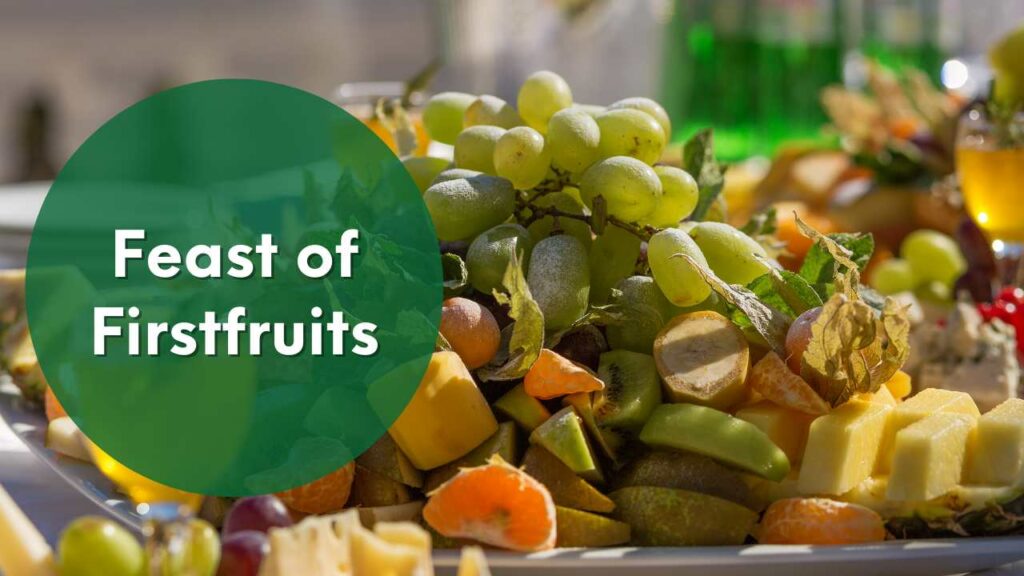In the Old Testament, it is known as “Chag ha-Bikkurim” in Hebrew, which translates to “Feast of the First Fruits.”
It falls on the third day after Passover and marks the beginning of the barley harvest in ancient Israel.
This feast is also known as the “Day of Firstfruits” and it is considered a significant event in both Jewish and Christian traditions.
The Feast of Firstfruits holds great spiritual significance for both Jews and Christians. For Jews, it symbolizes the first fruits being offered to God as a thanksgiving offering for the bountiful harvest. It also serves as a reminder of God’s provision and faithfulness to his people.
For Christians, the Feast of Firstfruits is seen as a foreshadowing of Jesus’ resurrection. Just as the first fruits were offered to God, Jesus was also presented as the first fruit of the resurrection, paving the way for believers to have new life in him.
This feast is mentioned throughout the Bible in various forms.
In Leviticus 23:9-14, God instructs the Israelites on how to observe the Feast of Firstfruits.
In Deuteronomy 26:1-11, it is part of the instructions for bringing the first fruits as an offering to God.
In the New Testament, Jesus’ resurrection is referred to as the “firstfruits” in 1 Corinthians 15:20, further connecting the significance of this feast to Christianity.
Today, some Christian churches celebrate the Feast of Firstfruits as a way to honor Jesus’ resurrection and as an opportunity to give thanks for God’s provision in their lives. It is also a time to reflect on the sacrifice of Jesus and the hope that his resurrection brings.
In Jewish tradition, the Feast of Firstfruits is still observed as part of the Passover celebrations. It is also known as “Yom HaBikkurim” which means “Day of Firstfruits.” Jews still bring offerings of their first fruits to God as a way of thanking him for his blessings.
The Feast of Firstfruits serves as a reminder for believers in both Judaism and Christianity to trust in God’s provision and have faith that he will continue to provide for their needs. It is also a time to give thanks for all of the blessings received throughout the year.
This feast also highlights the importance of giving back to God and acknowledging him as the source of all good things. As believers, we are reminded to bring our first fruits, whether it be our time, talents, or resources, to the Lord and trust in his faithfulness.
The Feast of Firstfruits holds great spiritual significance for both Jews and Christians. It serves as a reminder of God’s provision, faithfulness, and the hope that comes with Jesus’ resurrection. By observing this feast, we are reminded to give thanks, have faith, and trust in God’s provision for our lives.
It is a time to celebrate and remember the blessings that come from following God’s commandments and living a life of obedience to him. So let us continue to honor and observe the Feast of Firstfruits, both as a celebration of God’s goodness and as an act of worship to him.
Feast of Firstfruits FAQs
Q: Is the Feast of Firstfruits only observed by Jews and Christians?
A: Yes, this feast holds significance for both Judaism and Christianity, as it is mentioned in the Bible in both the Old and New Testaments.
Q: Why is the Feast of Firstfruits important?
A: The importance of this feast lies in its representation of God’s provision and faithfulness, and as a foreshadowing of Jesus’ resurrection. It also serves as a reminder for believers to trust in God and give thanks for his blessings.
Q: How is the Feast of Firstfruits observed?
A: In Jewish tradition, offerings of first fruits are brought to God during the Passover celebrations. In Christianity, some churches may hold special services or celebrations to honor Jesus’ resurrection and give thanks for God’s provision. Overall, it is a time of reflection and gratitude for believers in both Judaism and Christianity.

